|

Winter 2000 (8.4)
Pages
66-69
With Iron Will and Determination
Forging
a New Strategic Industry - Baku Steel Company
Interview with
Paolo Parviz
by Pirouz Khanlou
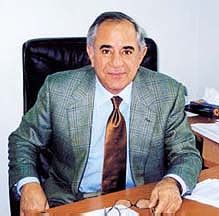  Paolo Parviz, one of the most successful
foreign entrepreneurs in Baku, has dared to undertake another
major project - construction of the Baku Steel Factory, a steel-melting
factory that will recycle Azerbaijan's wealth of scrap metal
into reinforcing bars and steel billets. Parviz, an Azerbaijani
who was born in Iran and educated in the West, has been active
in Baku since 1993. He was the driving force in establishing
the city's world-class hotel complex - Hyatt Regency, Park Hyatt
and the Hyatt Towers. Next, he got involved with bottling Shollar
water. His group's investment efforts - one of the first in Baku
- have paid off, not just monetarily, but also in the personal
satisfaction of creating something valuable for the country. Paolo Parviz, one of the most successful
foreign entrepreneurs in Baku, has dared to undertake another
major project - construction of the Baku Steel Factory, a steel-melting
factory that will recycle Azerbaijan's wealth of scrap metal
into reinforcing bars and steel billets. Parviz, an Azerbaijani
who was born in Iran and educated in the West, has been active
in Baku since 1993. He was the driving force in establishing
the city's world-class hotel complex - Hyatt Regency, Park Hyatt
and the Hyatt Towers. Next, he got involved with bottling Shollar
water. His group's investment efforts - one of the first in Baku
- have paid off, not just monetarily, but also in the personal
satisfaction of creating something valuable for the country.
This is the second time that Pirouz Khanlou, Publisher of Azerbaijan
International, has interviewed Paolo Parviz; the first time was
after the completion of the Hyatt complex. See "Welcome
Mat for Foreign Investment, " AI 7.3, Autumn
1999.
Well,
it looks like you're at it again. It seems you couldn't sit still
after completing this extraordinary Hyatt complex. Now you've
started another bold venture, totally different from before.
Why a steel melting factory? How did you get involved with this?
The answer is simple. It's a new, young country that is creating
a lot of opportunities for development and investment. I got
involved because I think there's an opportunity to create a steel
industry in this country. The raw materials are here. Some skilled
workers are here. Strategically, it's in a great location for
the markets. And basically, we have been greatly encouraged by
the President and the Prime Minister to create this industry.
As to not being able to sit still: one has to get up in the morning.
One always wants to do something. It really makes no difference
what you do during the day as long as you do it well. It's a
project.
The idea for building a steel melting factory came to me when
I saw all of this raw scrap material for a steel melting industry.
The idea just came from looking around the country. Needless
to say, there's a great deal of scrap around here because Azerbaijan
had been a landlocked country; they couldn't export it to other
countries that could melt the steel. So that was good fortune
for this country, and there is a considerable amount of scrap
for years to come, so long as it is not exported.
So that was the greatest incentive. If you want to create an
industry in any country, you start from the basis of having the
raw materials for it. That was at the heart of the decision-making
process.
Where does the scrap come from?
Used metal products. Old factories. Under the Soviet system,
they weren't very conscious of the environment. As cultured as
the people were, on the other hand, they were very casual when
it came to taking care of the environment. Recycling as it is
done in the West is still a new concept for former CIS countries.
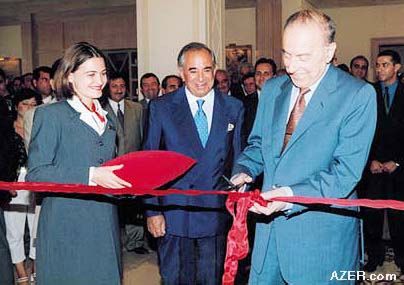
Above: President Aliyev at
the Opening Ceremony of the Park Hyatt Complex in 1999. Paolo
Parviz proudly looks on.
The steel industry is a mother industry that will provide opportunities
for other people to buy liquid steel from Baku Steel Company
and make other products out of it.
Steel is a basic industry, just like oil is for the petrochemical
industry. Besides that, it goes a long way toward cleaning up
the environment in Azerbaijan. Once steel is used, for example,
in an old car, it's very difficult to get rid of. You can't bury
it. In the West, they recycle these things and make new steel
out of them. So this industry will serve the country from an
environmental point of view as well.
What is the background of steel melting or steel factories
in this country?
There has not been a steel melting factory here. There have been
a considerable number of machine shops for producing equipment
and pipes for the oil industry. But these were all Soviet-built.
Most have been closed down because the conditions have changed,
the markets have disappeared and there are higher expectations
for quality. So they've stopped. But there are possibilities
to rejuvenate some of these industries.
What is the background of the building where you've set up
the factory?
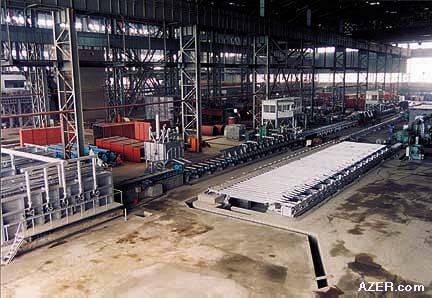
Above: Rebar manufacturing
section of the Baku Steel factory.
Originally, this building was intended to be a factory; it was
built in the 1980s to produce small airplanes. Then Moscow changed
its mind and decided to convert the factory to make large furnaces
for the entire Soviet Union. But it never really went into operation.
So we bought the factory, not for what it had been intended for
or for the equipment in it, but basically we bought the shell.
We needed a shell. Since all of these empty factories are here,
it would be silly to build another shell for a factory if you
can use an existing one.
We felt that it had the infrastructure. The factory never really
functioned for the purpose it was intended to serve. It just
sat there. Basically, the equipment was dilapidated. After upheavals
and the breakup of the Soviet Union, while Azerbaijan was being
rebuilt as a new country, the factory workers (the few that they
had) didn't receive any wages. So they basically cannibalized
the factory and equipment and took out the motors or whatever
they could find - the copper and metal - and sold it.
The result was disastrous, as you have seen. The equipment that
was left was not useful to us. We took all of the old equipment
out and replaced it with steel melting equipment: a 260,000-ton
capacity rebar mill, which is a larger capacity than the country
needs at this time, but there are neighboring markets where we
can export the steel.
How large is the factory?
We have 50,000 square meters under roof, but the property in
total is about 40 acres.
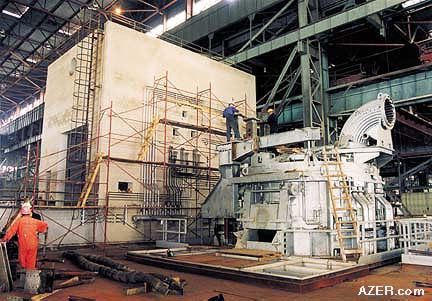
Above: German-made hearth
for melting down scrap metal.
Is there any other factory like this in the region?
No, not within 1,200 km. There are factories in Iran and the
Ukraine. These are the closest ones.
Are you using local know-how and workers?
Yes, an investment in a basic industry like steel or oil, not
only creates jobs within your own company, but it creates jobs
for other people in many other industries as well. I was told
that our work in constructing this factory has resulted in jobs
in Baku for 18 different companies in addition to our own crew,
which includes approximately 500 workers right now for building
the factory. These 18 companies have sizable contracts with us
in helping to build the factory.
As I understand, in terms of the machinery in this factory,
you're building it yourself rather than importing it from the
outside.
In the steel industry, obviously, there's some sophisticated
machinery that we've brought in from Germany, Italy and the U.S.
But some types of simpler non-machinery equipment, such as platforms
and cooling beds - which are simple to make - are produced here.
They're bulky and heavy. You can't afford to bring them from
Europe.
We have our own engineers. We get the designs and build them
here. Again, this process has created jobs for all of these people
during these past two years.
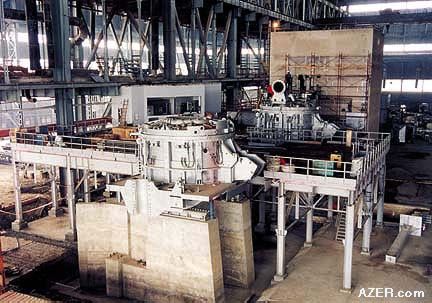
Above:
Steel melting
equipment with cutting-edge technology imported from Germany,
Italy and the U.S. Much of the steel structure of the Baku Steel
Factory was built by local industrial crafstmen. December 2000.
You talked about meeting environmental standards in this factory.
Anyone who has been exposed to the West is very conscious of
high environmental standards. I think the countries of the former
Soviet Union are becoming conscious of that more and more.
You can't produce steel in Baku and generate smoke these days.
So what are you going to do? It isn't right or fair. We've invested
more than $2 million in equipment alone, just for filtering out
smoke to make sure this factory operates up to European standards
- the best of European standards. That means we don't create
any smoke.
This is probably the biggest investment in the non-oil sector
that is being carried out in this country.
Yes, it is. More than $80 million, in two stages.
How did you come up with the idea? Did you wake up one morning
and say: "My Hyatt project is done."
Yes, this country offers a great deal of opportunities. I've
always received encouragement from the leadership of this country
to work here. It's not just money - it's the feeling of accomplishment
here. Nobody needs me in America and Europe. But I can be a little
bit more useful around here. I'm thankful that they give me an
opportunity to do something, so that when I wake up in the morning,
I've got a project. It's not always easy, but it certainly beats
getting up in the morning and having nothing to do.
It looks like you love to tackle the "impossibilities".
I'm just like most people. I like a certain amount of challenge.
If it's easy, it's not fun. Building a steel industry in this
country - or in any country - is certainly not an easy thing
to do. There are a lot of hiccups. There are a lot of problems,
a lot of rules and regulations that you have to overcome. But
I think that once you gain the reputation in this country that
you are sincerely trying to do something, you get help. I don't
really have any complaints about any individual authorities.
In fact, they are helpful and they don't get in my way.
Sometimes, there are some impractical laws and heavy bureaucracy
that have been left over from the old days. This can be cumbersome
and create difficulties, but we overcome them. It's a young country,
so I expect these things, and I've gotten used to them. In fact,
if they were eliminated and everything was perfect here, I think
I would miss them because I'm so good at handling them now (laughs).
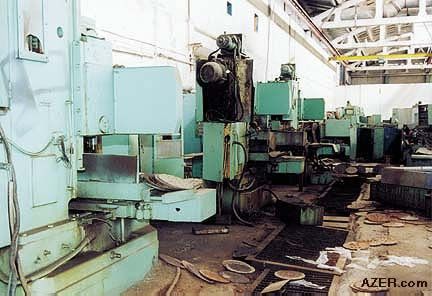
Above: Baku Steel Factory
is housed in what was intended to be a factory but never went
into production because of the collapse of the Soviet Union in
1991. The equipment, though never used before, had been vandalized,
and parts sold.
A lot of people complain about these old rules and regulations.
In all fairness, I have certain advantages. I'm Azerbaijani myself.
I speak the language. I feel closer to the people. I kiss a lot
of men with mustaches around here to get the job done, I can
tell you that. And then you have to do a bit of screaming, a
bit of fighting, a bit of loving and you move things along. I'm
familiar with the culture. I like this culture. We are one and
the same people. That gives me an edge over an American who might
be landing here. They have the cultural barrier to overcome.
You didn't grow up in this country. Most of your life was
spent in the U.S. and Europe. How did you bridge the gap so fast?
I really think that it's in your blood. As you get older you
get closer to your roots. I was born in Iranian Azerbaijan. I
have certain sympathies for Iran. And yet I have a greater sympathy
for Azerbaijanis within Iran because we are a slightly different
culture. A Sicilian living inside Italy feels closer to another
Sicilian than to a Milanese. A Texan feels closer to a Texan
than to a Bostonian. It's all part of human nature. You feel
closer to your own people.
Would you encourage others to come here?
If it were easy and perfect, everybody would be here. It's difficult
- that's why everybody isn't here. That's the disadvantage. But
if you have the guts to come here, you can be first. Then you
get a better return on your investment, and you have an opportunity
to build something.
So would you even encourage people who don't have any background
to come here?
Absolutely. Come here. Be patient and put up with some of the
difficulties. This country certainly needs more investing workers
than Parviz in this town. I wish there were 200 of us. I wish
there were a thousand of us here to help to build the economy.
Then we would all benefit. People need jobs, and we need to develop
this economy as quickly as possible.
You've worked in a number of countries - the U.S., Europe,
the Middle East, Africa. Do you find these people are different
from those in other countries, especially those in developing
countries?
Well, I have my own definition for the former Soviet Union. There
are developed countries like the industrialized nations of Europe
and the United States. And then there are the underdeveloped
countries, like in the Middle East and Africa. But when it comes
to the former Soviet Union, I call it "mis-developed".
They were extremely advanced in certain areas - they were the
first to go into outer space. On the other hand, they were extremely
weak in the consumer product industry.
There is education; there is culture. The education level in
Azerbaijan is higher than in Iran and Turkey. But because of
the system, the initiative was not there. Decision-making was
centralized. They've always made collective decisions. Everything
was collective, including decision-making. When everything is
collective, it's inefficient.
How does that affect your work today?
I go beg. I go from Ministry to Ministry. I go to the Prime Minister's
Office. They are kind enough to receive me. I move my own papers,
because I can't work at their pace. When you undertake a project,
timing is crucial because you can lose your shirt in it.
In capitalism, the investor must make a return on his capital
or else he goes bankrupt. In the Soviet Union, there was no such
thing as bankruptcy, except that the whole country went bankrupt.
There was no such thing as individual bankruptcy; it was a collective
bankruptcy. They all went bankrupt together - everything.
What difference do you see now with individual workers, given
these Soviet hangovers from the past?
They are very good people. They are very appreciative of having
jobs. I think we treat them decently. We pay them better wages
than anybody else in town. They work hard. We're happy with them.
How would you compare this project with the Hyatt complex?
What are the differences? What are the similarities? Because
that, in itself, was also a major pioneering project.
Different businesses have different difficulties. But a project
is a project. When you wake up in the morning wanting to do a
job, it makes no difference. You solve the problem of the day.
There are no standard problems. If there were, there wouldn't
be any problems, would there? If we knew what the standard problems
were, there wouldn't be any because the geniuses of the world
would have eliminated them. No matter how many problems you solve,
there is always a new one.
But this is life. That's what human beings are marvelous at-we
solve the problems as we go along, and we create some if we don't
have any.
Do you get tired of resolving these problems?
Of course, I get tired. But I go to bed and sleep well and get
up in the morning. You get addicted to solving problems. In fact,
if I don't have any, I create some myself. Your total nervous
system gets used to solving problems.
You've played an important role in this country, being part
of the development of this country after it gained its independence
[1991]. How do you see the future of this newly independent country?
You need a sense of history before you can pass judgment about
the present or the future. If you take a look at when you and
I first came here seven years ago, there were no shops. There
was no bread.
There really weren't even any stores - just a few government
shops that were mostly empty. If you take a look at what has
been achieved in the last six years, it's amazing. Today, you
can find anything in this town. In other words, the shop-keeping
economy started only about seven years ago when they didn't even
have any bread available in the morning. This is a monumental
achievement.
If somebody had told you seven years ago: "We plan to open
15,000 shops in Baku," you would have said: "Oh my
God, forget it! How can you open 15,000 or 20,000 shops in five
years? Impossible."
But this is a perfect illustration. If you give liberty to people
and stability to the society, people solve their own problems.
The government didn't build these 20,000 (or however many) shops
that exist today. The people did.
Shops opened. Bazaars opened. You can find whatever you want
in this town today. All the leadership has to do is to create
enough stability and security for people to open shops and do
the job. This is a perfect example of what happens when people
have the chance to solve their own problems.
In Baku, you can find everything: clothing from Italy, Europe,
whatever you want. The people did this. That's why the old system
didn't work. Everybody sat on their hands and waited for the
government to do it.
How do I see the future in this country? As long as there is
political stability, people will find a way. The laws will change;
the bureaucracy will become less cumbersome. But it takes time
to transform a country from a state-controlled Communist-Socialist
system of economy to capitalism. Even if you change the laws,
a great deal depends on the mentality. Naturally, the bureaucracy
doesn't want to let go because the government has always controlled
the power.
In democracy and capitalism, the power is supposed to be in the
hands of the people. It takes time for that to develop. In a
person's lifetime, five or ten years are a long time. But in
the life of a country, ten years is nothing. Considering the
achievements that have been made these past six or seven years,
I would say it's because of the political stability that the
leadership has created in this country. And that's why I'm very
optimistic.
Do you have any plans to retire?
No, I'm too busy to retire. I don't have time. I'm having fun
doing these things. Retiring for me would be like queuing up
in line to be hauled away. So no, it's not on my agenda.
______
From Azerbaijan
International
(8.4) Winter 2000.
© Azerbaijan International 2000. All rights reserved.
Back to Index
AI 8.4 (Winter 2000)
AI Home
| Magazine Choice | Topics
| Store
| Contact
us
|